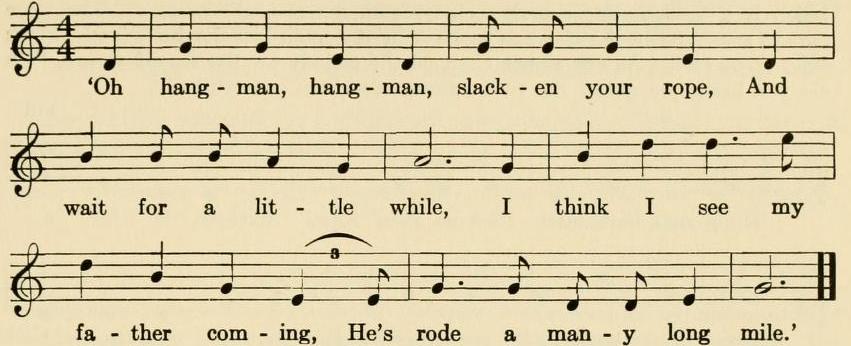The Sorrowful Tree- Hampton (NC) 1915 Brown A
[My title, replacing the generic title. From the Brown Collection of NC Folklore, II, 1952 and Volume IV, music. Listed as 30. The Maid Freed from the Gallows (Child 95).
Their notes follow. Rawn collected songs in Georgia c. 1910 that were given to Campbell and appeared in EFSSA, 1917, 1932.
R. Matteson 2015]
For preceding records of this ballad and its relation to theories of communal origin, see BSM 66, adding to the references there given New Hampshire (NGMS 117-18), Kentucky (BTFLS in 95), Tennessee (SFLQ XI 129-30), North Carolina (FSRA 35-6), Florida (FSF 295-9), Arkansas (OFS I 146-8), Missouri (OFS I 143-4, 145), Ohio (BSO 62-4), Indiana (BSI 125-7), and Michigan (BSSM 146-8 — this last being the "golden ball" form, rare in this country). In only half of the North Carolina texts is it a woman that waits to be freed from the gallows ; in versions B C E K L it is a man, and in D the sex is indeterminate. D is the only one of our texts in which the song has been turned into a play.
A. ['The Sorrowful Tree'] or 'The Maid Freed from the Gallows.' From the collection of Miss Isabel Rawn (later Mrs. W. T. Perry), who got it from Belvia Hampton of Warne, Clay county, in 1915.
1 'Oh hangman, oh hangman,
Wait for a little while;
I see my father coming;
He's rode a many long mile.
2 'Oh father, oh father, did you bring me any gold,
Or did you bring me free,
Or have you come to see me hung
Upon the sorrowful tree?'
3 'Oh daughter, oh daughter, I did not bring you gold,
Nor did I bring you free;
But I have come to see you hung
Upon the sorrowful tree.'
This three-stanza form is repeated for mother, brother, and lover; but the lover's reply is different:
12 'Oh sweetheart, oh sweetheart, I did bring you gold
And I did bring you free,
But I did not come to see you hung
Upon the sorrowful tree.'
______________________________
A. 'The Maid Freed from the Gallows.' From the collection of Miss Isabel Rawn. Sung by Miss Belvia Hampton. Recorded at Warne, Clay county, in 1915. The first two measures with up-beat are identical with those of the Nora Hicks' version of 'Little Musgrove and Lady Barnard' (26G) as well as the E. Sanders' version of 'Leap Frog John' (vol. V). The fourth and fifth measures remind one of 'Oh, Susanna.'

For melodic relationship cf. *SharpK I No. 28A, measures 1-2. Scale: Mode III, plagal. Tonal Center: g. Structure: abca1 (2,2,2,2) = ah (4,4).